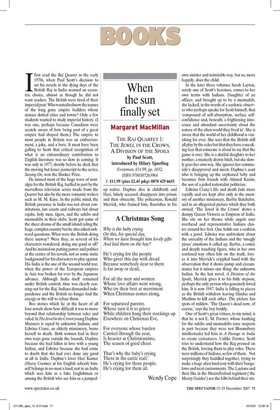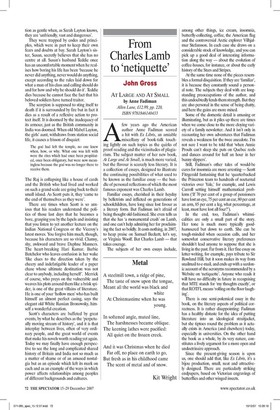When the sun finally set Margaret MacMillan THE RA
When the sun finally set Margaret MacMillan THE RAJ QUARTET 1: THE JEWEL IN THE CROWN, A DIVISION OF THE SPOILS by Paul Scott, introduced by Hilary Spurling Everyman, £14.99, pp. 1032, ISBN 9780307263964 © £11.99 (plus £2.45 p&p) 0870 429 6655 Ifirst read the Raj Quartet in the early 1970s, when Paul Scott's decision to set his novels in the dying days of the British Raj in India seemed an eccentric choice, almost as though he did not want readers. The British were tired of their imperial past. Who wanted to know the names of the long gone empire builders whose statues dotted cities and towns? Only a few students wanted to study imperial history. (I was one, perhaps because Canadians were acutely aware of how being part of a great empire had shaped them.) The empire to most people in Britain was an embarrassment, a joke, and a bore. It must have been galling to Scott that critical recognition of what is an extraordinary contribution to English literature was so slow in coming. It was only in 1977, shortly before he died, that the moving but lesser postscript to the series, Staying On, won the Booker Prize.
He missed most of the huge wave of nostalgia for the British Raj, fuelled in part by the marvellous television series made from the Quartet but also by the more romantic writers such as M. M. Kaye. In the public mind, the British presence in India was not about constitutions, law courts and railways but about rajahs, holy men, tigers, and the sahibs and memsahibs in their clubs. Scott got some of the sheer drama of the small island ruling the huge, complex country but he also asked awkward questions. What were the British doing there anyway? Were they, as several of his characters wondered, doing any good at all? And he insisted on putting power and politics at the centre of his novels, not as some static background for his characters to play against. His India is the one of the second world war, when the power of the European empires in Asia was broken for ever by the Japanese advance. Although India itself remained under British control, time was clearly running out for the Raj. Indians demanded independence and the British no longer had the energy or the will to refuse them.
Two stories which lie at the heart of all four novels show how difficult it was to move beyond that relationship between ruler and ruled. In The Jewel in the Crown young Daphne Manners is raped by unknown Indians, and Edwina Crane, an elderly missionary, burns herself to death. Both women had in their own ways gone outside the bounds, Daphne because she had fallen in love with a young Indian, and Edwina because she had come to doubt that she had ever done any good at all in India. Daphne's lover Hari Kumar (Harry Coomer at his English school) himself belongs in no-man's-land, not in an India which sees him as a fake Englishman or among the British who see him as a jumpedup native. Daphne dies in childbirth and Hari, falsely accused, disappears into prison and then obscurity. The policeman, Ronald Merrick, who framed him, flourishes in his own sinister and inimitable way, but so, more happily, does the child.
In the later three volumes Sarah Layton, surely one of Scott's heroines, comes to her own terms with Indians. Daughter of an officer, and brought up to be a memsahib, she lacked, in the words of a sardonic observer who perhaps speaks for Scott himself, that 'compound of self-absorption, surface selfconfidence and, beneath, a frightening innocence and attendant uncertainty about the nature of the alien world they lived in'. She is aware that the world of her childhood is vanishing for ever. She sees that the British still all play by the rules but that they have a sneaking fear that someone is about to say that the game is over. She is a dutiful daughter to her mother, a masterly drawn bitch, but she slowly goes her own way. She ignores her community's disapproval and meets Daphne's aunt who is bringing up the orphaned baby and becomes firm friends with Ahmed Kasim, the son of a jailed nationalist politician.
Edwina Crane's life and death fade more rapidly and are kept alive only in the memory of another missionary, Barbie Batchelor, and in an allegorical picture which they both owned. 'The Jewel in the Crown' shows a dumpy Queen Victoria as Empress of India. She sits on her throne while angels soar overhead and representative Indians cluster around her feet. One holds out a cushion with a jewel. Edwina was ambivalent about the unreality of the Indians and the 'smugly pious' emotions it called up. Barbie, a comic and deeply touching figure, who in her own confused way often hits on the truth, forces it into Merrick's crippled hand with the observation that it shows pomp and circumstance but it misses one thing: the unknown Indian. In the last novel, A Division of the Spoils, Merrick gives it to his little stepson, perhaps the only person who genuinely loved him It is now 1947. India is falling to pieces as the British withdraw leaving Hindus and Muslims to kill each other. The picture has spots of mildew. 'The Queen's dead now, of course,' says the boy briskly.
One of Scott's great virtues, to my mind, is that he is not E. M. Forster, whose loathing for the sahibs and memsahibs (one suspects in part because they were not Bloomsbury intellectuals) led him in A Passage to India to create caricatures. Unlike Forster, Scott tries to understand how the Raj pressed on the British, forcing them to play roles. There were millions of Indians, so few of them. Not surprisingly they huddled together, trying to make a huge alien land cosy with their bungalows and neat cantonments. The Laytons and their like in the Muzzafirabad regiment (the Muzzy Guides') see the hills behind their station as gentle when, as Sarah Layton knows, they are 'unfriendly, vast and dangerous'.
They were trapped by codes and principles, which were in part to keep their own fears and doubts at bay. Sarah Layton's sister, Susan, secretly believes that she has no centre at all. Susan's husband Teddie once has an uncomfortable moment when he realises how boring his life has been 'because he never did anything, never would do anything, except according to the rules laid down for what a man of his class and calling should do and for how and why he should do it'. Teddie dies because he cannot face the fact that his beloved soldiers have turned traitor.
The scorpion is supposed to sting itself to death if it is surrounded by fire but in fact it dies as a result of a reflexive action to protect itself. It is doomed by the inadequacy of its armour, just as the British community in India was doomed. When old Mabel Layton, the girls' aunt, withdraws from station social life, it causes a frisson of disquiet: The god had left the temple, no one knew when, how, or why. What one was left with were the rites which had once been propitiated, once been obligatory, but were now meaningless because the god was no longer there to receive them.
The Raj is collapsing like a house of cards and the British who had lived and worked on such a grand scale are going back to their small island. As Scott puts it, they 'came to the end of themselves as they were'.
There are times when Scott is so anxious that his readers understand the politics of those last days that he becomes a bore, grasping you by the lapels and insisting that you listen to yet another lecture on the Indian National Congress or the Viceroy's latest moves. You forgive him much, though, because his characters are so vivid. Clumsy, shy, awkward and brave Daphne Manners. The heart-breaking Hari Kumar. Barbie Batchelor who leaves confusion in her wake 'like clues to the direction taken by the cheery and indefatigable leader of a paper chase whose ultimate destination was not clear to anybody, including herself'. Merrick of course, who preys on the vulnerable and weaves his plots around them like a brisk spider, is one of the great villains of literature. He is one of your 'hollow men' who has built himself an almost perfect casing, says the elegant old White Russian Bronowsky, himself a wonderful creation.
Scott's characters are buffeted by great events, by what he describes as the 'perpetually moving stream of history', and it is that interplay between lives, often of very ordinary people, and the great world of events that make his novels worth reading yet again. Today we may finally have enough perspective to see the long and complicated shared history of Britain and India not so much as a matter of shame or of an amused nostalgia but as an episode which left its mark on each and as an example of the ways in which power affects relationships among peoples of different backgrounds and cultures.


































































































 Previous page
Previous page